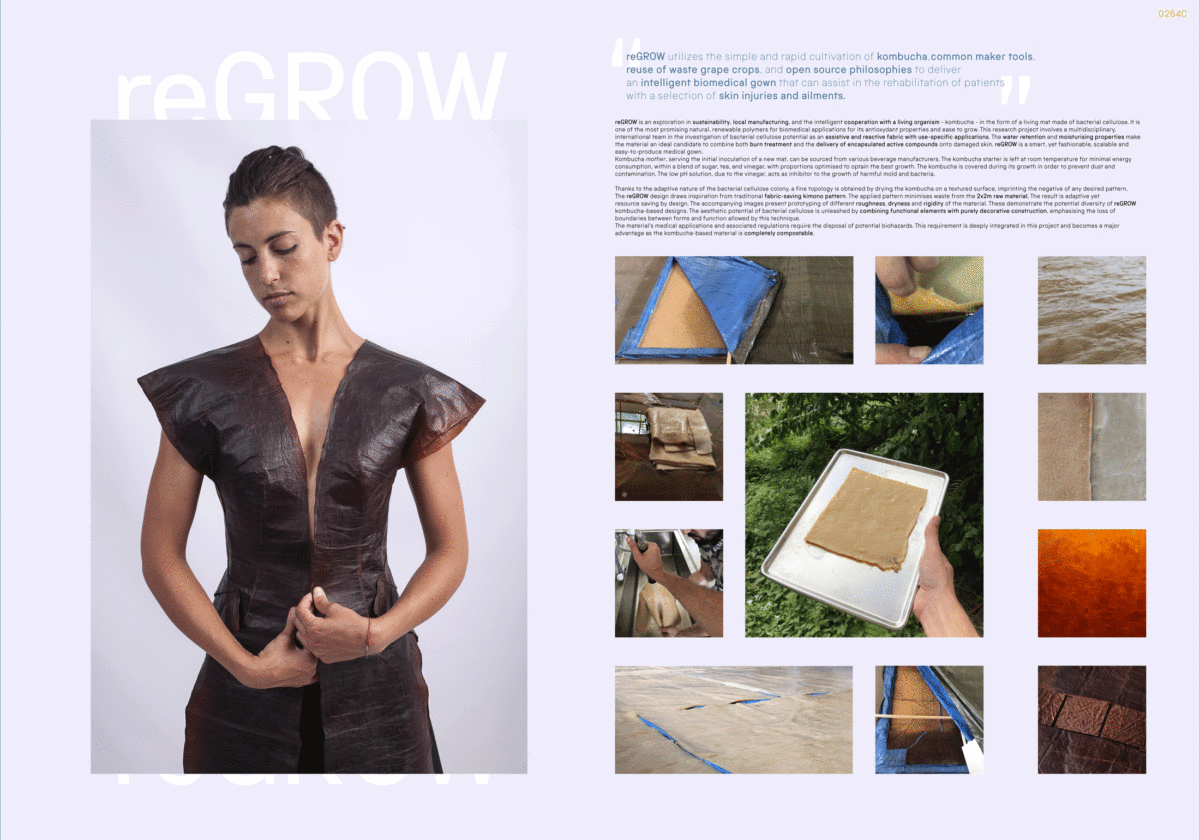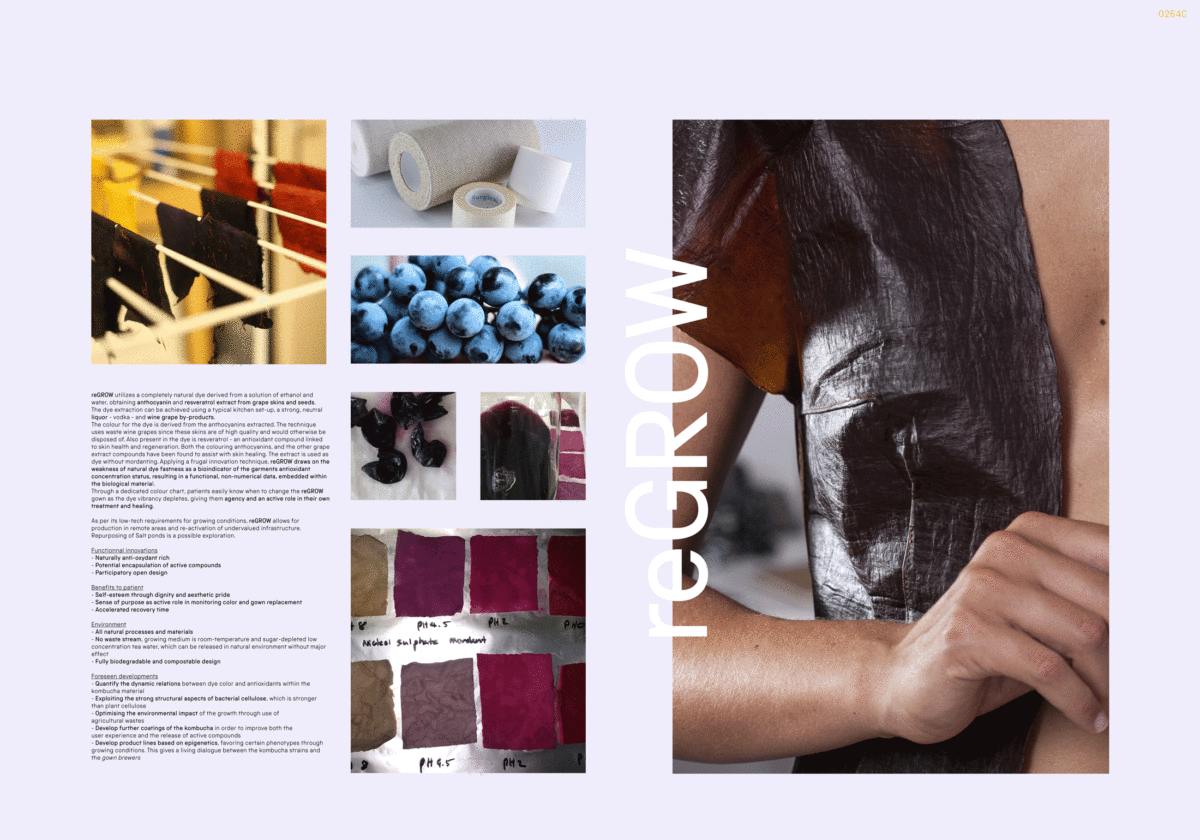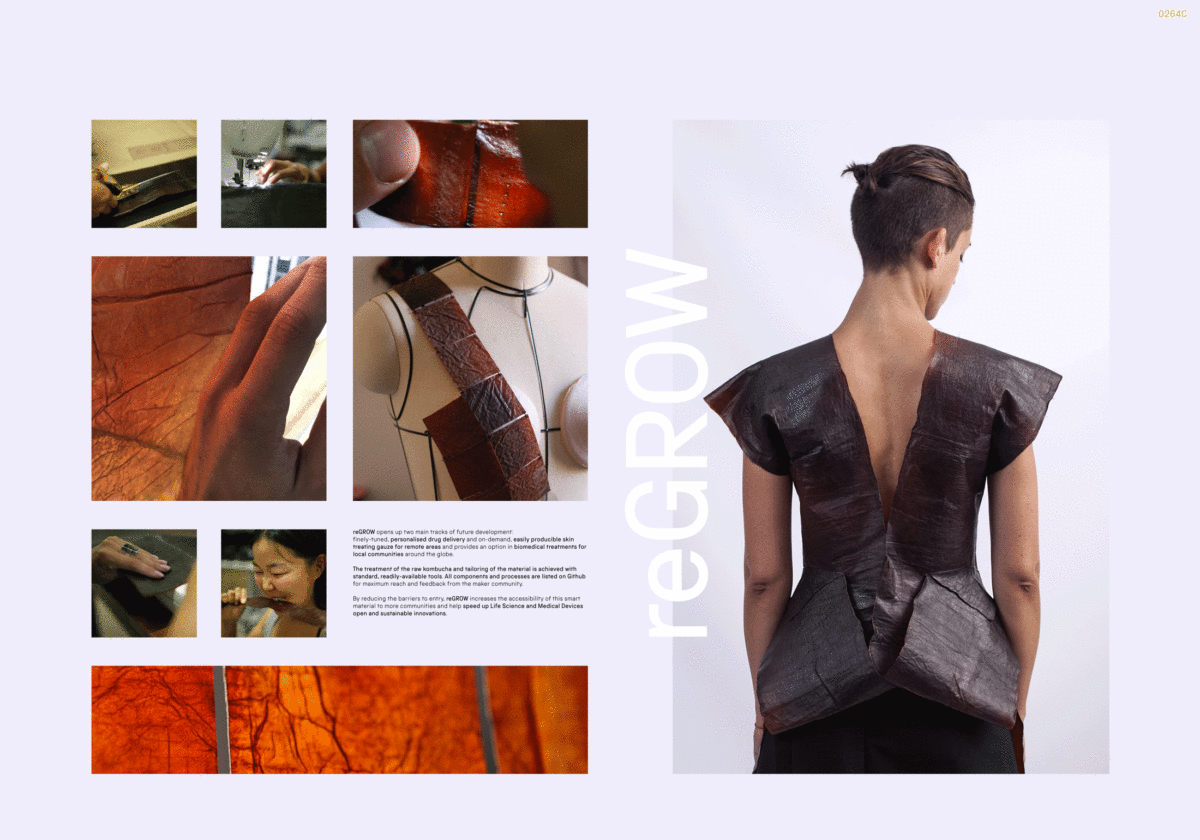RESHAPE18 | sensing materialities
wearable technology category
reGROW
Project coordinator: Adrien Rigobello
Material maker: Vivien Roussel
Fashion designer: Surzhana Radnaeva
Ecosystem designer: Benjamin Denjean
Designer: Tim Leeson
Collaborating researcher: Dr Robert Pott

Design is an agent for values and vision. reGROW is an exploration in sustainability, local-manufacturing and the intelligent use of a living organism – kombucha.
Kombucha , a bacterial cellulose, is one of the most promising natural, renewable polymers for biomedical applications.
reGROW utilizes the simple and rapid cultivation of kombucha, common maker tools, reuse of waste grape crops and open source philosophies to deliver an intelligent biomedical gown that can assist in the rehabilitation of patients with a selection of skin injuries and ailments.
The reGROW project involves a multidisciplinary, international team in the investigation of bacterial cellulose potential as an assistive and reactive fabric with use-specific applications. The water retention and moisturising properties make the material an ideal candidate to combine both burn treatment and the delivery of encapsulated active compounds onto damaged skin. reGROW is a smart, yet fashionable, scalable and easy-to-produce medical gown.
reGROW addresses two important daily issues for burn patients: the biocompatibility and efficiency of medical gauze material; and the often-overlooked issue of post-traumatic self-esteem. Combined, these properties enable patients to use the design as a true, easy-to-personalise, beneficial second skin, without having to hide it or secure it under additional layers of clothing.
reGROW builds upon a diverse literature that demonstrates the benefits of bacterial cellulose to skin contact in the treatment of burns, skin tears, ischemic wounds and skin grafts. Utilising an innovative dye derived from grape waste that is rich in antioxidants creates a natural and beneficial exchange between the plant-based extracts, living microorganisms, patients and the community of growers. The reGROW team sees the biocompatibility of kombucha as a prefiguration of a future design that advances microbiota-human interactions.
Severe skin injuries require extended recovery periods, therefore, it is crucial to know the level of embedded medication in the material. Applying a frugal innovation technique, reGROW draws on the weakness of natural dye fastness as a bioindicator of the garments antioxidant concentration status; resulting in a functional, non-numerical data, embedded within the biological material. This highlights the beneficial functions and relationships of microbial and plant genetic evolution.
While the antioxidant rich dye can be repeatedly applied over the duration of treatment, the material’s medical application and associated regulations require the disposal of potential biohazards. This requirement is deeply integrated into the project vision – becoming a major advantage. Through a dedicated colour chart, patients easily know when to change the reGROW gown. They are given agency with an active role in their own treatment and healing. The kombucha-based material is completely compostable, returning nutrients to the soil, increasing its water retention and enriching microflora. reGROW uses a cold-temperature dyeing technique; lowering energy use, production time and environmental impact.

The manufacture of reGROW relies on nature’s self-fabrication. The treatment of the raw kombucha and tailoring of the material is achieved with standard, readily-available tools. All components and processes are listed on a Github for maximum reach and feedback from the maker community. By reducing the barriers to entry, reGROW increases the accessibility of this smart material to more communities.
Selecting the kombucha species, instead of strains typically applied within clinical research programmes, improves ease of culture, availability and materials properties. Similarly in utilising sugar, instead of other nutrients (glucose, fructose, etc) for kombucha growth, allows for decentralized production.
The beneficial dye can be extracted using a typical kitchen set-up, a strong, neutral liquor (e.g. vodka) and wine grape by-products. Overall, the smart prototype material, that’s globally reproducible, can be produced for under 20€/m² (expected under 10€ given economies of scale).
reGROW opens up two main tracks of future development: finely-tuned, personalised drug delivery and on-demand, easily producible skin treating gauze for remote areas and provides an option in biomedical treatments for local communities around the globe.


